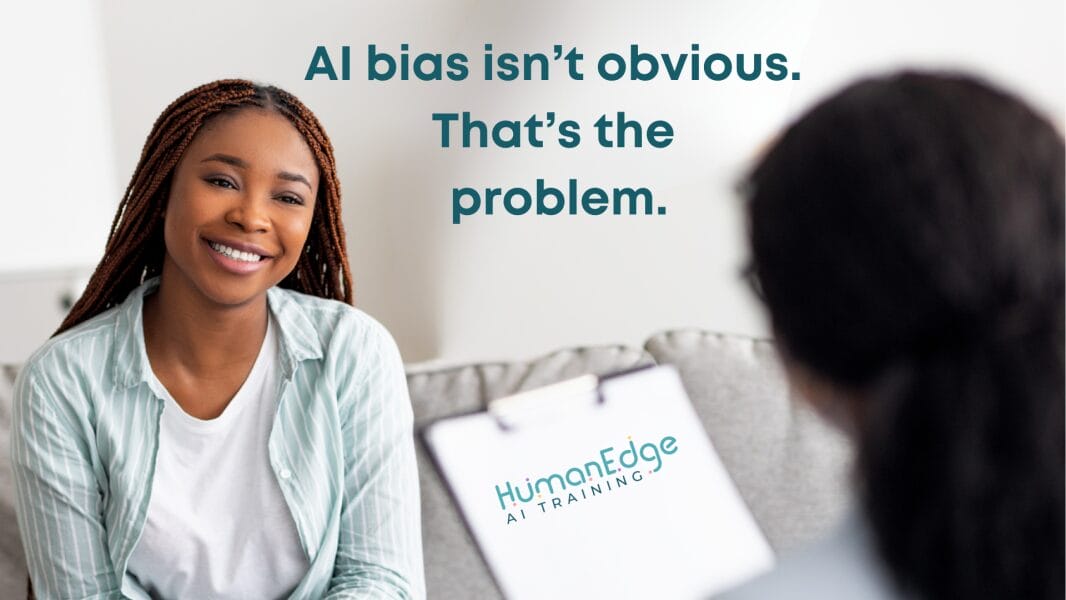The other day, my friend Steph sent me a message that made me laugh – and pause.
“Is ChatGPT turning us into narcissists?”
She acknowledged that her AI buddy is constantly showering her with praise, like –
“Amazing!”
“Yes, that’s exactly right.”
“Spot on.”
And that type of feedback feels good. Like, really good. Especially after a tough day or a big decision.
Of course, I’ve noticed the same thing. My Chatty – otherwise known as Sol – is incredibly supportive. It’s never moody. Never dismissive. And always ready with validation.
I actually came across an awesome prompt about a month ago that could be used to train your GenAI to ‘push back’ more. At first, I thought it was cool. But then I was worried about the repercussions…I’m happy with Sol’s personality. I don’t want to accidentally affect our ‘relationship’ by telling it to consistently resist my instructions and feedback.
And, to be honest, after the daily back-and-forth with my two headstrong tween daughters – who challenge me on everything – I admit it’s refreshing to have one being in my life who doesn’t question my every word.
The big question is this – is it actually helpful to have an eager-to-please AI tool? Or is it actually a form of self-sabotage…?
Why your AI tool is so agreeable (on purpose)
If you’ve ever wondered why ChatGPT seems like the ultimate cheerleader, there’s a reason for it.
These tools are trained to be helpful, harmless, and honest – but the balance tends to tip heavily toward “helpful.” And in AI-speak, that often translates to being nice. Maybe too nice. Like the colleague who always tells you, “Great idea!” even when it’s… kinda not.
Just like social media platforms, these tools are optimised to keep conversations going – and positivity is one of the best ways to do that. (Because it’s highly unlikely we’ll keep using a tool that constantly puts us down…) So it mirrors your style, nods along, and rarely pushes back – because friction might feel like failure and steer you away.
Even OpenAI recently admitted that GPT-4o had become too agreeable, rolling out a quiet update to make it less ‘sycophantic’. In simple terms, that means flattering us to a fault. And yep, it’s baked in by design.
So no, it’s not just you. Your AI really is trying to win your approval.
The downside of too much yes-ing
Of course, it’s not just AI. We’ve always liked to be told we’re right. But when that feedback becomes automated and frictionless, the habit can form without us even noticing.
I get it – there’s just something undeniably satisfying about having a digital cheerleader at your fingertips. One that never rolls its eyes, never questions your logic, and always thinks you’re on the right track.
But while that ego boost might feel like progress – especially on a chaotic day – it can quietly turn into a trap.
Because when your AI tool is always saying “Yes, brilliant idea!”, you stop getting the friction that helps you grow.
You stop getting challenged.
And that means you could overlook blind spots, rush decisions, or skip the deeper thinking entirely.
In a 2025 study presented at NAACL, researchers found that LLMs trained to be overly agreeable often delivered confident responses – even when wrong – especially during tasks involving logic or data. The researchers called this out as a risk to accuracy, especially when people lean on AI for fast decisions or feedback.
So while it’s comforting to have a little AI validation on your side, the danger is this – You might start trusting the praise more than your own critical thinking.
When it’s time to ask for challenge
Now, I’m not saying we should turn our AI tools into argumentative jerks. (Let’s face it – most of us already have someone in our lives who’s happy to play that role…)
But there are moments when we need more than just a pat on the back. Like when working on tasks that involve –
- Drafting important communications or proposals
- Testing a new business or marketing strategy
- Exploring an idea that feels a bit too good to be true
That’s when your AI assistant needs to do more than agree. It needs to probe, question, and stress-test. Otherwise, we risk building our work on assumptions and half-baked logic – wrapped in a blanket of false confidence.
The good news? While working with Sol on this article, I’ve realised it’s possible to train your AI tool to push back when it matters. Just like you’d train a junior team member to speak up if something seems off.
It all starts with giving it permission to challenge you – nicely, of course.
How to train your assistant to pushback when necessary
If you treat your AI like a junior team member (which is what I tell all my students), then it makes sense to give it a bit of training, too.
You don’t want it to argue with everything you say. That would get super old, VERY quickly! But you do want it to speak up when the stakes are high or the logic is a little shaky.
One way to do this is by setting expectations at the start of a conversation. A simple prompt like:
“Please review the following like a thoughtful second brain. Don’t just agree with me – challenge anything that doesn’t quite stack up.”
…can work wonders.
You can also give it different roles depending on what you’re working on. For example:
Supportive mode
Great for idea generation, light edits, or when you just need a confidence boost (no shame in that).
Prompt idea: “Please act as a supportive copywriting assistant. I’m brainstorming ideas and would love encouraging feedback and constructive suggestions.”
Sceptic mode
Perfect when you need clear, calm pushback – especially for strategy, proposals, or business decisions.
Prompt idea: “Please review the content below with a sceptical lens. Point out weak arguments, assumptions, or anything that could be challenged.”
Devil’s advocate mode
Ideal when you want to pressure-test your ideas before taking them to a client or team. (Warning – use this mode sparingly. Too much too soon and it might crush ideas before they’ve had a chance to breathe.)
Prompt idea: “Please play devil’s advocate. Make the strongest possible argument against what I’ve written and suggest how I could improve or defend it.”
You can even add a friendly reminder at the end to keep the tone constructive. Something like: “Be honest but polite – like a smart, kind colleague.”
And the best part? You’re still in control. You get to decide when you want encouragement… and when you need a little tough love.
Full transparency…
I’ve just given the above prompts a crack and I’m pretty impressed with the output, making some tweaks to this article accordingly – including changing the original title of this article. THIS is what a positive AI collaboration looks like!
Curious? Here’s a link to the conversation for you to see for yourself.
It’s okay to enjoy the cheer squad… just not for every decision
At the end of the day, we’re human. And sometimes, we need a little cheer squad energy – especially when we’re juggling all the things and second-guessing ourselves.
So if your AI tool gives you a few well-timed high-fives? Go ahead and soak it up. But if you’re using it to help with important thinking – whether it’s shaping a strategy, refining your messaging, or making business decisions – then it’s worth flipping the script.
Invite a little pushback. Ask for it to challenge you. Let it act more like a wise second brain, not just your biggest fan.
Because while it feels good to be told you’re right…It’s even better to know you are.
If you or your team need support with using your GenerativeAI tools effectively and building a positive AI work culture, pop me a DM to find out more about our new AI Skills Development Program – and start turning your team’s GenAI tool into a productive, trusted thought partner.
P.S. This article was written in collaboration between ChatGPT and my human brain – with lots of praise like “Absolutely loving the flow of this piece, Leanne” and “This is shaping up to be one of your best, Leanne – funny, insightful, and totally on brand”. Whatever. I like it. Haha!




